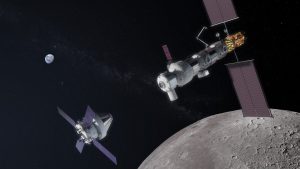
Artist’s impression of a lunar gateway. Image credit: NASA
The summer might be “silly season” in the press, but not so in astronomy. With peroxide on moons and belching black holes there’s lots of sensible research going on for us to discuss.
A number of recent rocket engine tests lead us to consider what the near future of space travel might look like, with a proposed “lunar gateway” providing a staging point for explorers. Where might they go? Perhaps as far as Jupiter’s moon, Europa, where recent observations have provided more evidence of a carbon-rich environment beneath the sub-surface ocean. A tantalising place to look for life.
Further afield, NASA’s TESS satellite has produced its first tranche of results after a year of observations. They show intriguing worlds that fall in what’s been appearing to be a “mass gap” in terms of planets, with a narrow range of masses being under-represented.
On somewhat larger scales we have the black hole at the centre of our Milky Way galaxy, which appeared to briefly brighten earlier this year – evidence that it may have belched after a small snack. There’s even something odd with the galaxy as a whole, with a survey of Cepheid variable stars showing a distinct lop-sided warp to the Milky Way’s disk of stars.
An extended edition of an original broadcast on 30th August 2019 as part of Pythagoras’ Trousers on Radio Cardiff.





